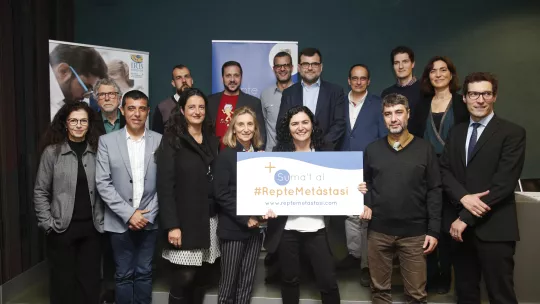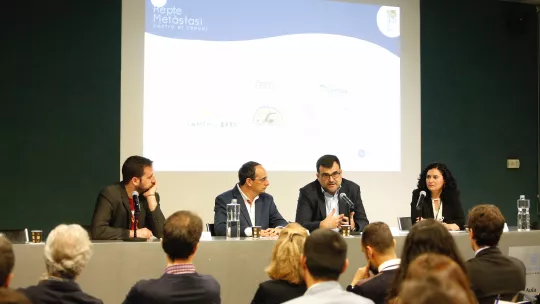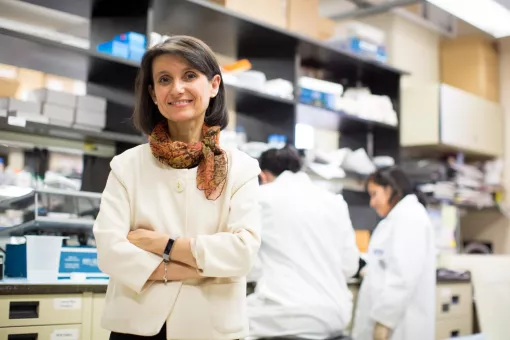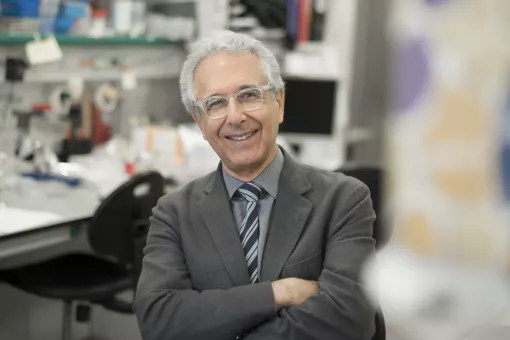Images
Through the campaign called #MetastasisChallenge, the centre aims to raise €5 M over the next four years.
Metastasis is responsible for 90% of deaths from cancer, and this campaign aims to rally social support for research in order to speed up discoveries.
This morning the Institute for Research in Biomedicine (IRB Barcelona) has launched the #MetastasisChallenge campaign, with the aim to call society to action in the fight against metastasis. The centre seeks to rally social support of research into metastasis—the main cause of death from cancer—and to raise €5 M over the next four years.
The funding raised through the #MetastasisChallenge will allow the centre to accelerate research, recruit new talent, purchase cutting-edge technology and equip new laboratories, such as a metastasis research unit.
Francesc Posas, director of IRB Barcelona, says, "It’s time to step on the accelerator. We are calling citizens, institutions and companies to get involved in research so that we can speed up advances. These resources will allow us to make a qualitative leap to drive clinical research and to achieve new treatments."
The engagement of society is crucial to speed up research. In this regard, IRB Barcelona has set up the web page https://www.metastasischallenge.com/, through which to receive donations and testimonies, and highlight outreach activities and institutions that support the campaign. Many individuals have already contributed to the campaign through initiatives such as Vi per Vida (Wine for Life) and Nadar Contra Corriente (Swimming against the Current). Furthermore, support has been received from companies and institutions such as Sysmex and the Fundación Fero, and last year the Institute received a bequest of €1.5 M.
A campaign to fight against metastasis
Metastasis describes the process by which a tumour that starts in a certain organ (primary tumour) spreads to distant organs, and it is the main cause of death from cancer. Fundamental research is therefore critical in tackling the challenges posed by metastasis. Any progress made in this field will benefit millions of people worldwide. The discoveries made in oncological research will have an enormous impact on the health and quality of life of those who have cancer.
The incidence of cancer is rising. According to the Sociedad Española de Oncología Médica (SEOM), one in every 2 men and 1 in every 3 women will develop cancer in their lifetime. In spite of the significant breakthroughs made, cancer continues to be the main cause of death among men and the second cause among women. But cancer has a problem and it is called metastasis.
"Metastasis is what makes cancer a problem. This is why we should all get involved with speeding up research to achieve a real impact," said ICREA researcher Eduard Batlle, coordinator of the Cancer Programme at IRB Barcelona and a CIBERONC member.
International reference in metastasis research
IRB Barcelona is a leading centre in metastasis research in Europe. In the last decade, its scientists have made significant contributions to advancing our understanding of this process and to improving the prevention, diagnosis and treatment of metastasis. The research done at IRB Barcelona is multidisciplinary and the scientists at the centre are in contact with the main hospitals of reference in Catalonia and pharmaceutical companies. This contact allows the Institute to have access to samples and to translate the discoveries made in the lab to clinical practice.
In the last 40 years, research has focused on the primary tumour and the early stage of cancer. The identification of genes, mutations and risk factors, among others, has contributed to the development of treatments and to the survival of cancer patients.
The unanswered questions about metastasis
IRB Barcelona conducts research into how various kinds of cancer, such as breast, colorectal, melanoma and oral cancer, among others, spread:
- The ground zero of metastasis and immunology: The researchers want to understand how metastasis starts and why the immune system allows cancer cells to spread to other organs and tissues of the body.
- Residual cancer and its relapse: Some cancer cells survive the treatment used to remove the primary tumour. The latent period of these cells causes the disease to reappear after a number of years and to metastasize.
- The risk factors of metastasis: diet and obesity: The cells responsible for the development of metastasis are tightly linked to the consumption of fatty acids, above all palmitic acid. Diet and obesity may therefore be key factors in the spread of the disease.
- Cancer genomics and personalised medicine: Cancer is a genetic disease in the sense that it presents alterations in the genome that are responsible for the development of the condition. Tumour sequencing and computational analysis of databases are crucial to increase our understanding of metastasis.
The metastasis research undertaken at IRB Barcelona came about from the momentum driven by the scientist Joan Massagué, one of the founders of the centre, which was set up in 2005, and current chair of the External Advisory Board. "We are starting to understand metastasis and we are getting closer to preventing it. Fundamental research is the only way to achieve this. We can accelerate progress if we join efforts and if society takes on this challenge as its own".
About IRB Barcelona
The Institute for Research in Biomedicine (IRB Barcelona) pursues a society free of disease. To this end, it conducts multidisciplinary research of excellence to cure cancer and other diseases linked to ageing. It establishes technology transfer agreements with the pharmaceutical industry and major hospitals to bring research results closer to society, and organises a range of science outreach activities to engage the public in an open dialogue. IRB Barcelona is an international centre that hosts 400 researchers and more than 30 nationalities. Recognised as a Severo Ochoa Centre of Excellence since 2011, IRB Barcelona is a CERCA centre and member of the Barcelona Institute of Science and Technology (BIST).












